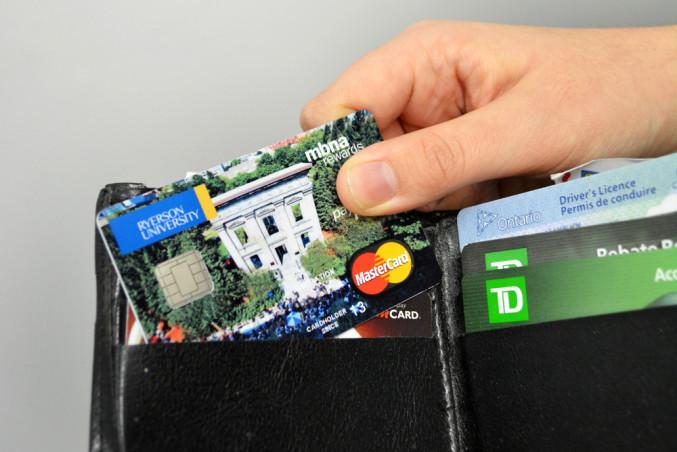By Angela Hennessy and Jackie Hong
Ryerson’s contract with MBNA bank is putting a dent in student credit.
The school profits off every student who signs up for a Master Card with the presence of the bank on campus.
MBNA partners with Ryerson’s Alumni Association and comes through what is called an “affinity partnership” which blocks any other bank from offering a similar service at Ryerson and also promotes the product.
“Offering exclusivity on campus creates a partnership which ensures an advantageous financial return for the university, which is plowed back into programs, services, and student awards for our community,” said Tyler Forkes, executive director of alumni relations.
However, cash-strapped students in Ontario already face an average of nearly $40,000 dollars in debt upon graduation, not including any personal and private loans. Some people argue that offering students more credit isn’t the answer and the school shouldn’t be promoting it, much less profiting off it.
“Credit card companies seem to target students, as many students need money and are usually strapped for cash. These companies fail to properly alert and educate people, especially students about the danger of signing up for the card,” said vice president of education, Rochelle Lawrence.
Most students are not aware that simply filling out an application will negatively affect their credit and MBNA does not warn students about this.
Forkes argued that this was “common knowledge” when asked why this isn’t the practice of on campus solicitors.
Many people are not aware this could be a problem.
“It’s illogical that it could do that (negatively affect credit) because you couldn’t get a card unless you have good credit,” said Ryerson president Sheldon Levy.
“There are many negative implications like high interest fees and rates that students are now aware of once they use these cards, then companies further weigh students down with added debt,” said Lawrence.
In 2012 the on-campus event marketing of this product received 2054 responses and 1336 accounts were created. So far 2013 has seen another 1240 accounts created through this program.
The program largely operates through table space rentals on campus where representatives for MBNA solicit students.
“The revenues are very important, as they fund the vast majority of programs and services that we extend to all students upon graduation,” said Forkes.
The average interest rate offered with this card is 19.9 per cent, which is high rate but still standard when offering credit to people who have none. As an alternative to credit, other banks, such as TD, offer VISA debit cards, which allow students the freedom of having a credit card for things such as shopping online or booking flights, but without the risk of borrowing money at a high interest rate.
Ryerson’s suite of affinity partnerships currently includes MBNA for the Ryerson MasterCard; TD Insurance Meloche Mennox, Manulife Financial and the Canadian signature Wine Company.
Ryerson would not release further details about their contract, such as how much they profit from each student because it is confidential to the bank.










Leave a Reply